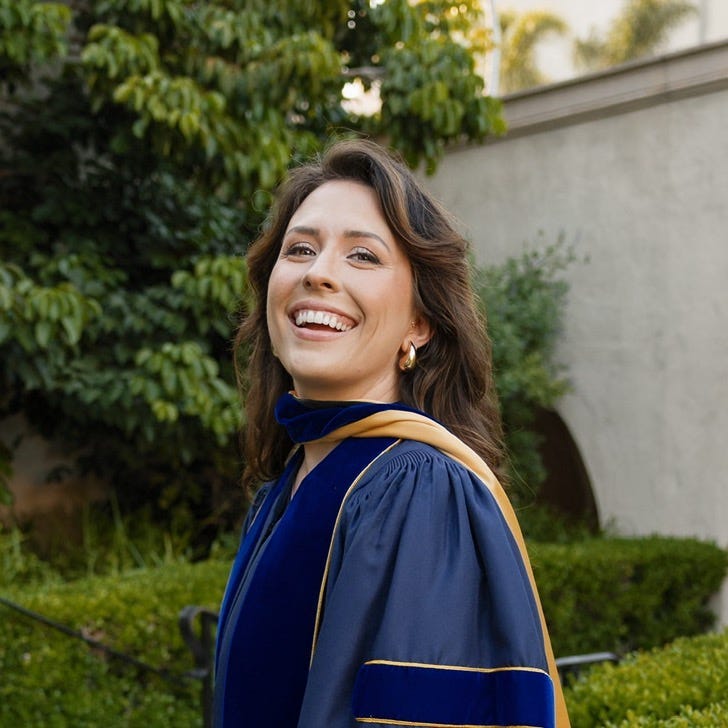We Know We’re Being Manipulated by AI—Now What?
Guest Post by Sydney Sullivan, Ph.D.
If you find value in our work and want to help shape the future of AI education and awareness, consider becoming a paid subscriber today. To make it easy, we’re offering a forever 20% discount through this special link:
Your support directly helps us broaden our reach and deepen our impact. Let’s build this together.
I want to share an exciting Substack discovery—Dr. Sydney Sullivan's work on media literacy just became my new must-read.
I found Sydney's writing this week while processing reactions to Google's latest deepfake tool. Like many of us, I've been watching AI video technology advance with growing dread, my gut reaction being: maybe we should all just log off and pretend it's 1995.
But Sydney won't let us retreat into that fantasy. What makes her work compelling is how she acknowledges our collective exhaustion without letting it become an excuse for giving up. Instead of stopping at "everything is fake now, so why bother," she offers something harder but more useful: practical skills to navigate this messy reality.
If you're looking for someone who cuts through both naive optimism and paralyzing cynicism about our digital moment, Sydney's your writer.
Nick Potkalitsky, Ph.D.
Media mistrust isn’t new. The real challenge in the new deepfake wave is pushing past skepticism.
This week, I came across something that stopped me mid-scroll: Google’s new Veo 3. It’s a video generation tool that lets anyone create hyper-realistic, almost cinematic AI videos. I watched a few demo clips. They were beautiful, detailed, eerily polished, and immediately felt that now-familiar mix of awe and unease.
As a media researcher, I’m always curious (and maybe a little anxious), about how the public views these new AI tools. So I opened the comments, wanting to see how other people were reacting. The responses were all over the place. Some were funny, some hopeful, others downright freaked out. But a pattern quickly emerged. Almost everyone, in their own way, was saying the same thing:
“I’m hoping the lack of trust now implodes social media and we all go outside and talk to each other more!”
“I hope everyone just stops looking at social media and we do a 180 turn and go back to the 90s.”
“This is happening much faster than I thought.”
“Maybe this is the final straw society needed to step back into the real world… face-to-face will become the only ‘trusted’ source of authenticity.”
When it comes to phones and technology, I see the argument of “returning to the good old days” constantly. However, I’ve spent enough time being against top-down phone bans in classrooms to know there had to be another lens to think about this fear around AI and deepfakes. I wasn’t willing to accept stopping at skepticism. And neither should you.
A Crisis of Meaning
This flood of manipulated content, especially deepfakes, is accelerating public distrust. According to Jumio’s 2025 Online Identity Study, 69% of global consumers are now more skeptical of all online content, and 74% express concern about video and voice deepfakes. But to be honest, skepticism isn’t new—and it shouldn’t be our final destination.
Mistrust in the media has been growing for decades. As Jesse Holcomb writes in a 2024 Trend article for The Pew Charitable Trusts, trust in journalism has steadily declined since the 1970s, fueled by political polarization, the rise of niche and partisan media, and economic disruption to the news industry. By 2023, only 11% of Republicans said they trusted the media, compared with 58% of Democrats. And this isn’t just about fake news—it’s about decades of structural shifts in how media is produced, funded, and perceived (source).
So yes, people are skeptical for good reason. Even Carl Sagan warned us in 1996:
“Skepticism must be a component of the explorer’s toolkit, or we will lose our way.”
But looking a little closer, we see it really is just one component. Where is our larger toolkit? Our real issue? Social media users have been stopping at skepticism. And if we stop at skepticism, we stay in survival mode. We know we’re being manipulated, but too often that knowledge paralyzes us rather than mobilizes us.
What if, instead, we used our skepticism as a springboard? Not just to doubt but to investigate, to discern, to act with intention? That’s the pivot I’ve been exploring in both my research and my classroom when I use critical media literacy.
Reclaiming Your Feed, Rewiring Your Brain
Issues with online content should not lead to unplugging or retreating into cynicism. It’s about building the cognitive and emotional muscles to discern, reflect, and engage with complexity—without collapsing.
We can use digital literacy tools such as:
Cognitive reappraisal: shifting how we interpret what we see online.
Intentional consumption: setting scroll boundaries and reflecting before resharing.
Community check-ins: talking through what’s overwhelming instead of numbing out alone.
Using the SHIFT methods or other “content” checking
The SIFT Method - Evaluating Resources and Misinformation - Library Guides at UChicago
In a world where even reality can be deepfaked, critical thinking and emotional clarity are no longer just nice to have—they’re survival skills.
Not giving Up, Burnout is Real but Moving Past Skepticism Still Matters
I remember feeling extreme burnout about halfway through my graduate degree. When you study media literacy and well-being, while also going through a pandemic, it can obviously be exhausting. I felt a mixture of “I cannot engage anymore please let me rot on the couch” and “I am not doing enough.”
As a college instructor, I see this in real time with my students too. Older generations make fun of Genz’s for being “too soft” or overly sensitive, but this perception seems oversimplified when you look at the media. My students are not apathetic—they’re burnt out. They care deeply about justice, truth, and community. But they’re exhausted by the misinformation, aestheticized trauma, and pressure to react perfectly to every issue online. They want to take a break from “the bad news,” but they also don’t want to look away.
I think a small moment that changed this perspective for myself seeing a silly but simple quote that read:
“I cannot do all the good the world needs but the world needs all the good that I can do.” ― Jana Stanfield
I saved it. I read it again the next day. I unapologetically put it as my instagram bio for a few months. I didn’t magically become unburned out, but it gave me a sliver of clarity. That led me to new kinds of podcasts and thinkers. Ones that didn’t just point out what was wrong, but offered a way to start showing up again without self-destructing. One idea that stuck with me is this:
Make changes to relieve your exhaustion.
It may sound counterintuitive, but the moment I started doing something in the real world to address what I hated online, I felt a little lighter. Not because the problem was fixed, but because I had moved past simply complaining and moved into action.
Angry about the treatment of women in today’s administration? Start a women's group and get together once a month—maybe donate to a woman-owned organization of your choice. This is something I still have going with a strong and inspiring group of women in San Diego and we’ve done events from candle making to just grabbing drinks.
Overwhelmed by climate doom? Pick one local initiative to support. Plant something. Show up to a city council meeting. Write a letter.
Feeling disconnected from your community? Start a community Slack. Plan a no-agenda hangout. Offer to guest speak in someone else’s classroom.
Feeling disillusioned by AI and the rise of deepfakes? Teach someone how to reverse-image search. Build a resource list. Run a workshop on digital literacy at your local library.
Tired of disinformation dominating your family group chats? Create or find a calm, respectful guide with simple tips for spotting misleading content. Host a “fact-check Friday” with your students or coworkers.
The point isn’t to do everything. The point is to do something. Not performatively. Not perfectly. But intentionally and in community.
Because here’s the secret: when we stop at skepticism, we stay stuck in survival mode. But when we turn our skepticism into curiosity and action, we get traction again. We start to remember what it feels like to care without burning out.
I share opinions like this and more praxis related tools with a well-being lens on my Substack sydneysullivanphd. As an educator in social media and well-being, my goal is to teach others how to navigate media fatigue, disinformation, and digital overwhelm without giving up on the world—or yourself.
Cheers,
Dr. Sydney
Check out some of our favorite Substacks:
Mike Kentz’s AI EduPathways: Insights from one of our most insightful, creative, and eloquent AI educators in the business!!!
Terry Underwood’s Learning to Read, Reading to Learn: The most penetrating investigation of the intersections between compositional theory, literacy studies, and AI on the internet!!!
Suzi’s When Life Gives You AI: A cutting-edge exploration of the intersection among computer science, neuroscience, and philosophy
Alejandro Piad Morffis’s The Computerist Journal: Unmatched investigations into coding, machine learning, computational theory, and practical AI applications
Michael Woudenberg’s Polymathic Being: Polymathic wisdom brought to you every Sunday morning with your first cup of coffee
Rob Nelson’s AI Log: Incredibly deep and insightful essay about AI’s impact on higher ed, society, and culture.
Michael Spencer’s AI Supremacy: The most comprehensive and current analysis of AI news and trends, featuring numerous intriguing guest posts
Daniel Bashir’s The Gradient Podcast: The top interviews with leading AI experts, researchers, developers, and linguists.
Daniel Nest’s Why Try AI?: The most amazing updates on AI tools and techniques
Jason Gulya’s The AI Edventure: An important exploration of cutting-edge innovations in AI-responsive curriculum and pedagogy.









This is great! Thanks to you, Nick, and to Sydney Sullivan for underscoring the value of skepticism and the importance of acting in small ways.
You've effectively put words on something I've often felt but never quite expressed.
It always rubbed me the wrong way when I heard people say something like "You can't trust mainstream media, which is why I only read *insert fringe news site / influencer / conspiracy theory group / etc.*
Healthy scepticism is useful, but only if it leads you into exploration and careful discernment rather than uncritical acceptance of any counter-narratives. You gotta extend the same scepticism to all sources and learn to navigate the information space with intention. So, yeah, don't get stuck in that survival mode.